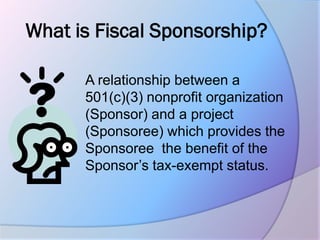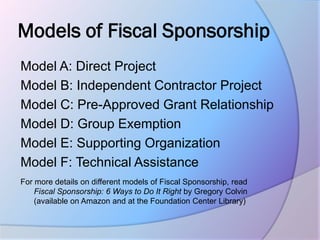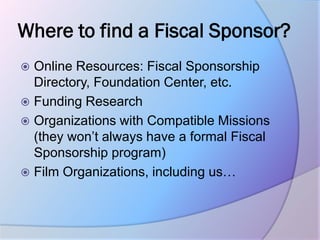Fiscal sponsorship presentation roundtable
- 2. What is Fiscal Sponsorship? A relationship between a 501(c)(3) nonprofit organization (Sponsor) and a project (Sponsoree) which provides the Sponsoree the benefit of the Sponsor’s tax-exempt status.
- 3. Why Might a Film Project Need a Fiscal Sponsor? ď‚ž Fundraising ď‚ž Credibility ď‚ž Technical Assistance ď‚ž Awaiting 501(c)(3) IRS determination (nonprofit status) of their own.
- 4. Why Not Form a Nonprofit?  Is this a single film or is it intended to serve a broader mission for public good?  Answerable to Board of Directors, not Staff.  Time and expense of filing and maintaining status – would you rather be focused on producing and distributing your film?
- 5. Models of Fiscal Sponsorship Model A: Direct Project Model B: Independent Contractor Project Model C: Pre-Approved Grant Relationship Model D: Group Exemption Model E: Supporting Organization Model F: Technical Assistance For more details on different models of Fiscal Sponsorship, read Fiscal Sponsorship: 6 Ways to Do It Right by Gregory Colvin (available on Amazon and at the Foundation Center Library)
- 6. Model C Fiscal Sponsorship The Project applies to become Sponsored, by sending a “grant application” to the Sponsor. Once accepted, the Project becomes a “grantee” of the Sponsor, allowing it to request funds through the Sponsor under the terms of their agreement.
- 7. Model C Fiscal Sponsorship Arts Project Fiscal Sponsor Funder
- 8. Responsibilities Under Model C Who Is Responsible for… Fiscal Fiscal Sponsoree Sponsor Maintaining 501(c)(3) nonprofit status X Fundraising, including writing grants X or seeking individual donors Handling donations directly from X grant-makers or donors Completing tax returns for the project X Paying employment taxes for the project X Disbursing funds to entity other than fiscal X sponsoree Legal liabilities to manage grant funds X X Other Legal Liabilities for Project X
- 9. Autonomy Under Model C Who… Fiscal Fiscal Sponsoree Sponsor Owns the rights to the project? X (X) Has creative control X (X) Has control over disbursement of funds X received from donors or grant-makers Has the right to terminate the relationship (X) X
- 10. Business Identity of Project Unless otherwise specified by the Fiscal Sponsor Agreement, the sponsored project could be undertaken by a sole proprietor, a business corporation or partnership, or another nonprofit organization. Fiscal Sponsorship Does Not Absolve Sponsorees of Tax Obligations!
- 11. What is a Fiscal Sponsor Looking for In a Project?  Project is non-profit in nature.  Project matches Sponsor’s mission and guidelines.
- 12. Read the Guidelines! Women Make Movies WIFV
- 13. What is a Fiscal Sponsor Looking for In a Project?  Project is non-profit in nature.  Project matches Sponsor’s mission and guidelines.  Project has been well-thought out enough (in writing!) to be fundable and achievable.
- 14. What does “fundable” mean?
- 15. What is a Fiscal Sponsor Looking for In a Project?  Project is non-profit in nature.  Project matches Sponsor’s mission and guidelines.  Project has been well-thought out enough (in writing!) to be fundable and achievable.  Project manager has realistic expectations of Fiscal Sponsor.
- 16. 15 Things You Should Look for in a Fiscal Sponsor 1. Do they sponsor projects like yours? 2. Which fiscal sponsorship model do they follow? 3. Do they provide clear guidelines and sample agreements? 4. What is their track record? 5. Do they have credibility within the funding community?
- 17. 15 Things You Should Look for in a Fiscal Sponsor 6. Do they offer other services or technical support? 7. What is their turnaround time for reviewing your application? 8. What is their process for reviewing your application? 9. What fees do they charge? Membership? Application? Maintenance? Administrative?
- 18. 15 Things You Should Look for in a Fiscal Sponsor 10. What is their process for accepting and informing you of individual donations? 11. How often do they pay out disbursements? 12. What are the reporting requirements? 13. What requirements do they have for you to maintain your Fiscal Sponsorship? 14. Do they require exclusivity? 15. How responsive are they?
- 19. Where to find a Fiscal Sponsor?  Online Resources: Fiscal Sponsorship Directory, Foundation Center, etc.  Funding Research  Organizations with Compatible Missions (they won’t always have a formal Fiscal Sponsorship program)  Film Organizations, including us…
- 20. About WIFV and Docs In Progress Fiscal Sponsorship Programs
- 21. Some current sponsorees DOCS IN WOMEN IN FILM PROGRESS AND VIDEO The New Woman: Chinatown Annie Documentary “Londonderry” by Yi Chen Kopchovsky by Gillian Willman Keter Betts We’re Not Broke by Ada Babino by Karin Hayes and Victoria Bruce The Peace The Last Song Agency Before the War by Sue Useem by Kiley Kraskouskas Refrigerator Ladies: the Remarkable Guardians of the Untold Story of Everglades the ENIAC by Connie Programmers Bransilver by Kathy Kleiman
- 22. Questions?






















